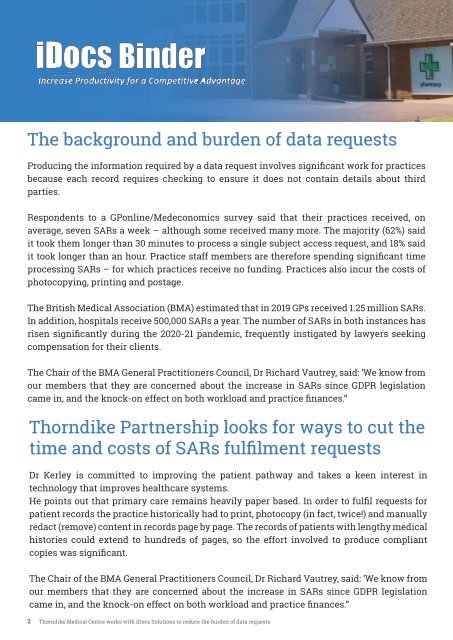You also want an ePaper? Increase the reach of your titles
YUMPU automatically turns print PDFs into web optimized ePapers that Google loves.
The background and burden of data requests<br />
Producing the information required by a data request involves significant work for practices<br />
because each record requires checking to ensure it does not contain details about third<br />
parties.<br />
Respondents to a GPonline/Medeconomics survey said that their practices received, on<br />
average, seven SARs a week – although some received many more. The majority (62%) said<br />
it took them longer than 30 minutes to process a single subject access request, and 18% said<br />
it took longer than an hour. Practice staff members are therefore spending significant time<br />
processing SARs – for which practices receive no funding. Practices also incur the costs of<br />
photocopying, printing and postage.<br />
The British Medical Association (BMA) estimated that in 2019 GPs received 1.25 million SARs.<br />
In addition, hospitals receive 500,000 SARs a year. The number of SARs in both instances has<br />
risen significantly during the 2020-21 pandemic, frequently instigated by lawyers seeking<br />
compensation for their clients.<br />
The Chair of the BMA General Practitioners Council, Dr Richard Vautrey, said: ‘We know from<br />
our members that they are concerned about the increase in SARs since GDPR legislation<br />
came in, and the knock-on effect on both workload and practice finances.”<br />
<strong>Thorndike</strong> Partnership looks for ways to cut the<br />
time and costs of SARs fulfilment requests<br />
Dr Kerley is committed to improving the patient pathway and takes a keen interest in<br />
technology that improves healthcare systems.<br />
He points out that primary care remains heavily paper based. In order to fulfil requests for<br />
patient records the practice historically had to print, photocopy (in fact, twice!) and manually<br />
redact (remove) content in records page by page. The records of patients with lengthy medical<br />
histories could extend to hundreds of pages, so the effort involved to produce compliant<br />
copies was significant.<br />
The Chair of the BMA General Practitioners Council, Dr Richard Vautrey, said: ‘We know from<br />
our members that they are concerned about the increase in SARs since GDPR legislation<br />
came in, and the knock-on effect on both workload and practice finances.”<br />
2<br />
<strong>Thorndike</strong> Medical Centre works with <strong>iDocs</strong> Solutions to reduce the burden of data requests



